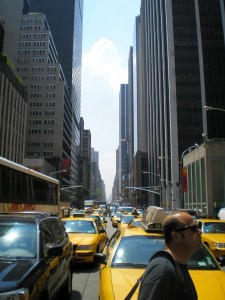There’s a really interesting article in Wired about Charles Komanoff, a New York resident who’s obsessively mapping every aspect of Manhattan traffic in online spreadsheets. The piece by Felix Salmon, “The Man Who Could Unsnarl Manhattan Traffic,” examines how the 62-year-old Tribeca activist and numbers cruncher is trying to make sense of Manhattan gridlock (environmental impact, safety concerns, reducing delays) with the aid of his Balanced Transportation Analyzer. Komanoff’s work has impressed experts on the subject not just in NYC but in Europe and Asia as well. An excerpt:
“Komanoff’s life has been driven by two passions: cycling and data. Naturally, he has combined them in another spreadsheet, one that logs every mile he has biked since January 1, 2001. The very act of entering the data, Komanoff says, keeps him motivated to ride everywhere, even in the rain and snow. ‘I want to be able to enter the miles,’ he says. He ends up inputting about 3,000 of them every year.
A bearded former antiwar activist, Komanoff grew up in a liberal enclave of Long Island and studied mathematics and economics at Harvard. In 1973, he analyzed a proposed hydroelectric facility in upstate New York whose business model relied on the existence of extensive nuclear power in the Northeast. He wrote a report showing that the kilowatt price of nuclear power was rising fast and that the economics of the scheme simply didn’t work. It was his professional breakthrough, and in 1981 he published a massive book on the subject, Power Plant Cost Escalation: Nuclear and Coal Capital Costs, Regulation and Economics. ‘I thought I’d never do anything that ambitious again,’ he says.
Over the next 30 years, Komanoff built a career at this intersection of algorithms and advocacy, especially around what he calls ‘the two leading sources of environmental and social harm in industrial societies: electricity generation and motor vehicles.’”
Tags: Charles Komanoff

